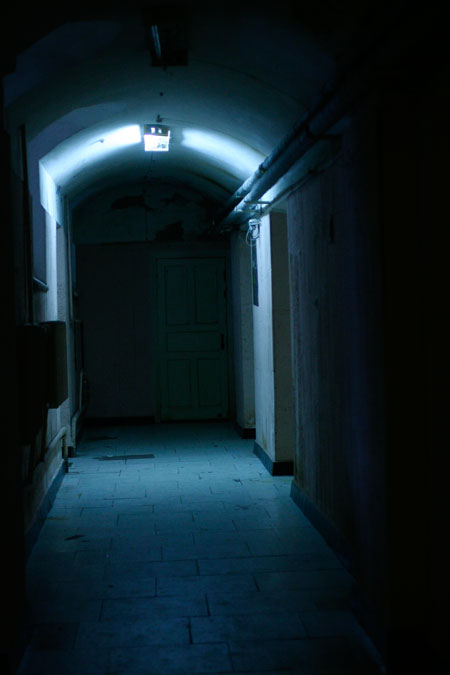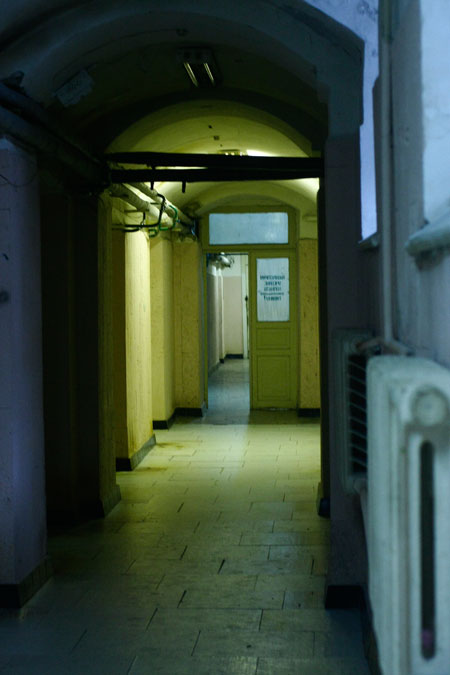“Over the cuckoo’s nest” means nowhere – cuckoos do not build nests. Yet this is exactly where many Ukrainians with mental disorders find themselves – between non-existing proper hospitals and the real life that their illness no longer makes available to them.
Schizophrenia, paranoia or manic–depressive disorder, now known under the more politically correct term, “bipolar affective disorder”, is the worst news – or a death sentence – for at least three out of 100 Ukrainians. Fortunately, others only see it in books or movies.
IN THE MIDDLE OF NOWHERE
“This is the end,” says a man diagnosed with schizophrenia. Unlike many others with a similar diagnosis, he realizes that he is sick. “Whoever says that it will be fine and that this can be treated is lying. You can’t prevent, stop or even slow down the progress of schizophrenia. So if diagnosed, a person is doomed.”
Others claim that they have managed to “almost return” to normal life after several months in a hospital and a year of intense treatment. Still, they live in terror between each exacerbation of their condition, often turning to faith and prayers for escape. More often, being aware of the symptoms of the illness, they learn to control themselves. One way is to try to suppress the voices and “stupid ideas” in their head and focus on real sounds instead. Some adjust their medicine dosage themselves. All this, just to stay out of hospital, even during the worst periods.
READ ALSO: Political Madness
Ukrainian “yellow buildings”, a colloquialism for psychiatric hospitals, are steeped in terrifying stories. Given the lack of supervision from the staff, just like in prison, the patients split up into groups; the cool guys, the losers and those that will do just about anything for a cookie, candy or cigarette. Punching, slapping and abuse become routine. In addition to cigarettes, inmates often have access to alcohol and weed. At some places, lice or scabies are common.

In addition to the choir of voices in their own heads, inmates get to hear another choir of real people screaming, moaning, crying and roaring with laughter. “Their hands tremble. They keep walking to and fro,” says an inmate. “I’ve seen a man with a bitten-off ear. The whole ear was gone; he just had an open hole in his head. I’ve seen 50-year old men that have never been with a woman. Some were digging in their own excrement for food.”
However, an environment that can drive anyone crazy is not the worst thing about psychiatric hospitals. Hopelessness is more terrifying, as patients only expect to eventually degrade into a vegetative state. “Much hospitalization, no hope,” another frequent patient of Pavlivka, a psychiatric hospital in Kyiv, describes his life laconically. “But there are people around who suffer much more than I do. I knew a 17-year old boy – a really nice, pure person. The illness finished him off in just three months. Over the course of one autumn! No one in Ukraine’s free mental healthcare system made any real effort to save him. And that’s in Kyiv! I dread to think about what is happening in provincial hospitals.”
IMPROVEMENTS TODAY
Doctors are well aware of this. The horrific state of psychiatry in Ukraine stems from a shortage of funding – a common issue in virtually every aspect of the Ukrainian reality.
“The healthcare system is underfunded,” says Andriy Karachevsky, a psychiatrist, candidate of medical sciences and lecturer at the Psychiatry and Substance Abuse Treatment Faculty of the Bohomolets Medical University in Kyiv. “Unfortunately, the available funding (3.4% of GDP – Ed.), rules out any proper treatment.” According to the estimates of the World Health Organization (WHO), governments must allocate at least 6% of their GDP to support their healthcare systems effectively.
“Take the UK: a day at a psychiatric hospital costs the government GBP 600 (USD 935.90),” says Prof. Karachevsky. “In Ukraine, daily funding is nearly UAH 17 (USD 2.13) to feed the patients, and UAH 4.5 (about USD 0.5) for medicine. How can a hospital operate under such conditions?”
READ ALSO: Just What the Government Prescribed
The government has strange means for “improving” the situation. Over the past few years, it has reduced the number of beds in psychiatric hospitals by 30%. As a result, patients only are hospitalized in extreme cases. Meanwhile, doctors say that the beds at in-patient hospitals are important for both patients who need and want treatment, and for compulsory hospital admission, which can in no way be avoided. “The risk of suicide and threat to the life and health of other people,” Borys Khersonsky, therapist and psychiatrist, names just a few of the reasons for forced hospital admission. “I would also add the patient’s inability to take care of him-/herself to the extent that such state threatens his/her life or health.”
NO MONEY, NO WORK
Another aggravating factor is carelessness. “Meager pay and zero support from colleagues or patients burn people out, resulting in a “we work as well as we are paid” attitude,” Prof. Karachevsky explains. In these conditions, the idea to make some extra cash is only natural. “Doctors start to expect a reward from the patient,” Prof. Karachevsky expands. “This ruins the doctor.”
Some psychiatrists go for more. “I think psychiatric repression in Ukraine today has nothing to do with politics, not like in soviet times,” says Borys Khersonsky. “For the most part, the abuse of office by doctors concerns assets, primarily real estate. I know such cases. Doctors and notaries make deals with a patient’s unscrupulous relatives to steal his/her property, albeit rarely.”
Patients’ relatives are not the only inventive fraudsters – the apartment of a person with no family will tempt anyone. Semen Hluzman, Chairman of the Psychiatrists of Ukraine Association, describes the practice of taking property from people with mental illness as “dreadful” and “pandemic”. Meanwhile, he stresses that notaries and the police contribute to it more than doctors do.
Another problem is that the qualifications of medical employees in Ukraine are not what they used to be. “This also applies to other post-soviet states,” Borys Khersonsky points out. One reason is that doctors are no longer motivated to continue studying, given that the quality of work is not reflected in salaries. As a result, professionals lack skills and knowledge. “Private practice helps to preserve the professional potential, at least to some extent,” Andriy Karachevsky believes. But private practice does not thrive in Ukraine either. According to Prof. Karachevsky, treatment at the Vydubychi Rehabilitation Centre which, among other services, provides psychiatric care is fairly costly. He admits that “I can’t think of it becoming profitable in the foreseeable future. That’s why we’re trying to work transparently and fairly. Taxes, rental fee… It’s really difficult.”

BAD HABITS
State clinics face different material problems. According to Khersonsky, inhuman conditions in many hospitals; the state of the premises, many of which were built over a hundred years ago and have not been renovated in decades; poor nutrition, are just a few.
Poor nutrition costs the taxpayer three times more than the treatment, UAH 17 and UAH 4.5 respectively. This means that medicine is an unimaginable luxury at state psychiatric hospitals which often lack the basics, let alone the luxury of chemicals to reveal substance overdose or the like.
As for modern medication, state hospitals have none, unless the patients’ relatives are willing to buy them. “Doctors are forced to treat patients based on what the latter can afford, not on what they need,” Prof. Karachevsky notes.
Elementary “traditional” medicines, used many years ago, are available. “They are not always bad! Sometimes, haloperidol or Aminazine (a local name for chlorpromazine known elsewhere as Thorazine or Largactil – Ed.) work, too,” he says. “But there are more innovative medicines now. Take antipsychotic drugs – they boost the patients’ chances of adjusting to society.” This is crucial as this often gives a patient the opportunity to live, rather than exist in a vegetative state.
READ ALSO: No more treatment for AIDS patients in Ukraine
Because of inadequate funding, hospitals still use insulin shock or insulin coma therapy. Invented in 1933, this treatment puts a patient into a coma using an insulin overdose. The civilized world abolished it almost 60 years ago. In Ukraine, it is still used sometimes, says Borys Khersonsky, albeit not as often as before.
The patients see all this, and they can’t but understand what is going on. “People just stop believing that they have a chance to get proper help at a state hospital,” concludes Prof. Karachevsky.
People are learning to survive on their own. Quite often, not only sick Ukrainians, but also healthy ones fail. “Mental health? Ukraine’s infant and teenage suicide rate is one of the highest in the world. The rates for adults are not much better. What health are we talking about?” Borys Khersonsky comments bitterly.
Meanwhile, patients share stories about hospitals abroad: there, doctors talk to patients every day, the food is good and the staff treats people with respect. They even take the patients’ preferences into account when prescribing treatment. “When I first saw One Flew over the Cuckoo’s Nest, I thought it was a health resort,” a patient creeps into the conversation.

